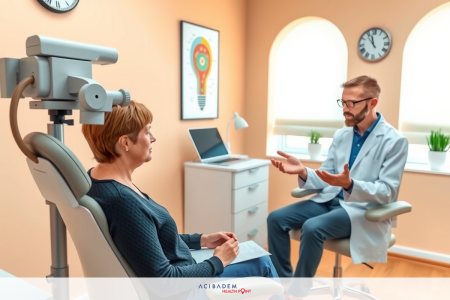Understanding Ophthalmopathy Definition – Eye Health
What is Ophthalmopathy?
Understanding Ophthalmopathy Definition – Eye Health Ophthalmopathy is a group of eye diseases. They can affect the tissues and muscles near the eyes. This can cause problems with vision and health of the eyes.
Definition and Overview
Ophthalmopathy refers to eye diseases with inflammation and damage to eye tissues. These issues can be due to autoimmune problems, genes, or the environment. If not treated, they can seriously affect life quality, says the American Academy of Ophthalmology.
Key Characteristics
Ophthalmopathy stands out because it has its own set of symptoms and rates of occurrence in different groups.
- Typical Onset: People often start to have ophthalmopathy as adults, especially those with autoimmune issues.
- Demographic Prevalence: It is more common in women. This may be because of gender-specific autoimmune responses.
- Distinguishing Features: It presents with bulging eyes, double vision, and the eyes not closing fully.
The unique features make it different from other eye diseases. They highlight the need for early and correct treatment.
| Characteristic | Description |
|---|---|
| Onset | Typically in adulthood |
| Demographic Prevalence | Higher incidence in females |
| Symptoms | Proptosis, diplopia, eyelid retraction |
Common Ophthalmopathy Symptoms
Knowing the ophthalmopathy symptoms is key. It helps catch the problem early. This way, we can stop vision impairment from getting worse. Watch out for signs in your vision and how your eyes feel.
Visual Symptoms
One big sign is seeing things blurry all the time. You might see double or find it hard to see clearly. Some people have trouble seeing at night or see dark spots and flashes.
Physical Symptoms
Your eyes might look and feel different too. They could be swollen, red, or hurt. Some might stick out more, mainly with Graves’ disease. You might also find your eyelids don’t close right or have trouble moving your eyes.
When to See an Eye Specialist
If you notice any of these signs, go see an eye specialist. Getting help early can lower risk of damage. The specialist will check your eyes and decide what to do next.
Ophthalmopathy Causes
It’s key to know what causes ophthalmopathy to lower risks and prevent it. Causes come from genes, things in the environment, and health conditions. Each of these can play a big part in making ophthalmopathy happen.
Genetic Factors
Problems with the eyes that run in families can start ophthalmopathy. Studies show that eye problems you get from your parents can hurt your eyes’ structure and work. If your family had eye issues like retinitis pigmentosa or a chance to get glaucoma, it’s really important to tell your doctor. Now, there are tests that can check for these problems early. This means you can handle ophthalmopathy before it gets serious.
Environmental Influences
Things in the air and what you do for work can also cause ophthalmopathy. Bad air, too much sun, and dangerous work conditions can harm your eyes. People who work in bright light or places with lots of chemicals are in more danger. Plus, smoking and what you eat make a difference. Health experts say wearing sunglasses outside and eating foods with lots of good stuff in them can help your eyes stay healthy.
Related Health Conditions
How your whole body is doing can also affect your eyes. Sicknesses like diabetes, high blood pressure, and cases where your body fights itself can cause eye problems. Having high blood sugar for a long time can damage the tiny blood vessels in your eyes, leading to diabetic retinopathy. Problems with your thyroid gland can cause Graves’ disease, which impacts your eyes. It’s very important to take care of these health issues to stop ophthalmopathy.
Now, let’s look at what causes ophthalmopathy:
| Causes | Examples |
|---|---|
| Genetic Factors | Retinitis Pigmentosa, Glaucoma |
| Environmental Influences | UV Exposure, Occupational Hazards, Nutrition |
| Related Health Conditions | Diabetes, Hypertension, Autoimmune Diseases |
Types of Ophthalmopathy
There are many eye conditions in ophthalmopathy. Each has special traits and effects on eye health. It’s key to know these types for quick diagnosis and good care.
Graves’ Ophthalmopathy
Graves’ ophthalmopathy comes from Graves’ disease. This is an auto-immune illness. It shows in bulging eyes, seeing double, and swollen eyes. Finding these signs early is very important. Without treatment, it can get worse fast.
Diabetic Retinopathy
Diabetic Retinopathy is common in those with diabetes. High sugar harms the retina’s blood vessels. This can cause vision loss and even blindness. To stop it, have eye check-ups often and manage diabetes well.
Others
There are more ophthalmopathy types like hypertensive retinopathy and myasthenia gravis. Uveitis is another one. Each needs special care. Doctors use guides and case studies. They make treatments that fit each type’s needs.
Ophthalmopathy Diagnosis
Finding ophthalmopathy involves looking at a patient’s past and running tests. This shows how important it is to understand both. This way, eye problems can be found and treated well. Understanding Ophthalmopathy Definition – Eye Health
Medical History Evaluation
First, doctors check the patient’s medical history. They look at past eye problems, other health issues, and family eye disease history. This helps find any genetic links and how the environment affects the eye. Understanding Ophthalmopathy Definition – Eye Health
Diagnostic Tests
Next, the patient has a full eye check-up. This includes important tests:
- Visual Acuity Test: Measures how well a person can see at various distances.
- Dilated Eye Exam: Allows the ophthalmologist to examine the retina and optic nerve for signs of damage.
- Tonometry: Measures the pressure inside the eye, crucial for detecting glaucoma.
There are also high-tech tests to see inside the eye. This includes OCT and fundus photography. They take clear pictures to spot issues early.
| Test Type | Purpose | Technology |
|---|---|---|
| Visual Acuity Test | Assess clarity of vision | Snellen Chart |
| Dilated Eye Exam | Inspect retina and optic nerve | Drops to dilate pupils |
| Tonometry | Measure intraocular pressure | Applanation tonometer |
| Optical Coherence Tomography | Detailed imaging of retina | OCT scanner |
By using these tools together, doctors get a full picture of the patient’s eyes. This helps them make a correct and quick ophthalmopathy diagnosis.
Ophthalmopathy Treatment Options
Treating ophthalmopathy involves using different methods. This can include medicines, surgery, and changing how you live. These help with the symptoms and reasons for the condition. They make the eyes healthier and improve life quality.
Medications
Medications are key in handling ophthalmopathy. They can be anti-inflammatory drugs, steroids, or drugs that lower the immune system. Lubricating eye drops and antihistamines also help keep the eyes working well and ease symptoms.
Surgical Interventions
If medicine isn’t enough, a doctor might suggest eye surgery. This can include procedures like orbital decompression and correcting eye misalignment. Studies show these surgeries can be very successful in improving eyesight and comfort.
Lifestyle Adjustments
Changing how you live is important in treating ophthalmopathy. This can be done by eating well, not smoking, and protecting your eyes. Exercises and ways to manage stress are also good for eye health. They can slow down the condition too.
| Treatment Option | Description | Success Rate |
|---|---|---|
| Medications | Anti-inflammatory drugs, corticosteroids, immunosuppressants | Varies, generally high with compliance |
| Eye Surgery | Orbital decompression, eyelid surgery, strabismus correction | Over 80% in clinical trials |
| Lifestyle Adjustments | Healthy diet, smoking cessation, eye protection | Effective in conjunction with medical treatments |
Ophthalmopathy Management Strategies
It’s key to manage ophthalmopathy well for good eye health. This means keeping an eye on things and stopping problems before they get worse. There are many ways to care for your eyes. Understanding Ophthalmopathy Definition – Eye Health
Regular Monitoring
Watching your eyes closely is a big part of care. Get eye checks with an ophthalmologist often. They use special tests like OCT to find small eye issues early. Understanding Ophthalmopathy Definition – Eye Health
Preventative Measures
Preventing eye problems is very important. Wear sunglasses to protect your eyes from the sun. Eating healthy and staying active keeps your eyes strong.
Not smoking and cutting down on screen time are good too. These choices can help your eyes a lot. Understanding Ophthalmopathy Definition – Eye Health
Taking care of your eyes helps you live better. Use these tips to manage eye problems well. It’s all about being proactive and taking care of your eyes. Understanding Ophthalmopathy Definition – Eye Health
Complications of Ophthalmopathy
Ophthalmopathy can cause serious problems if not treated well. It can lead to chronic eye problems. They make it hard to do daily things. You might need long medical care to handle them. Understanding Ophthalmopathy Definition – Eye Health
Without the right care, ophthalmopathy can hurt your vision. You could lose some or all of your sight. That’s why starting treatment early is so important. Understanding Ophthalmopathy Definition – Eye Health
Doctors say watch out for signs of ophthalmopathy’s risks. Regular check-ups and sticking to treatments can stop symptoms from getting worse.
At times, ophthalmopathy makes other eye problems get worse too. Studying more and teaching patients a lot keeps bad outcomes low.
| Complication | Description | Preventative Measures |
|---|---|---|
| Chronic Eye Problems | Long-term issues such as eye pain, dryness, and inflammation. | Regular eye exams, proper hydration, and usage of prescribed medications. |
| Vision Loss Risks | Increased chances of partial or total vision impairment. | Early detection, rigorous treatment adherence, and ongoing specialist consultations. |
Expert Care from Acibadem Healthcare Group
Acibadem Healthcare Group is shining bright in the field of eye care. Known for their wide range of services, they use the latest tools and treatments. This means patients get top-notch eye care. Their modern centers can handle many eye problems, making them a top choice worldwide. Understanding Ophthalmopathy Definition – Eye Health
If you need eye care, Acibadem Healthcare Group is here for you. They have a team of leading experts ready to help. Each person gets a plan that fits their needs exactly. This way of caring makes them one of the best in eye healthcare.Understanding Ophthalmopathy Definition – Eye Health
At Acibadem Healthcare Group, they mix high-tech with expert knowledge for top care. They offer treatments that work well and are not very invasive. So, from surgeries to imaging, every part of their care is about making you better. They are well-known for outstanding eye care. They are trusted for many eye problems. Understanding Ophthalmopathy Definition – Eye Health
FAQ
What is ophthalmopathy?
Ophthalmopathy covers different eye issues like diseases and conditions. These can hurt how our eyes work or look. Knowing about ophthalmopathy helps keep our eyes healthy and our vision good.
What are the key characteristics of ophthalmopathy?
It shows up with symptoms like not seeing well, feeling bad in the eyes, and eyes looking different. It can happen more in some people and can change a lot in how bad it is. Groups like the American Academy of Ophthalmology give details about these things.
What are the common symptoms of ophthalmopathy?
You might not see well, have eye pain, see them red and swollen, and might see double. Your eyes might stick out a lot or your lids might pull back. It's really important to get checked by an eye doctor if this happens. Catching it early is key.
What causes ophthalmopathy?
Things like genes, what's in the air and our food, and other health issues can cause it. Eye problems we inherit and things like too much sun or bad chemicals play a part. So do other health problems.
What are the types of ophthalmopathy?
The common types are Graves’ Ophthalmopathy and Diabetic Retinopathy. Graves’ links to thyroid problems, while Diabetic Retinopathy is about diabetes. There are also other, less known types.
How is ophthalmopathy diagnosed?
Doctors look at your medical history and do special tests like pictures and eye checks. They use advanced tools to find out what eye issues you have.
What are the treatment options for ophthalmopathy?
Treatments can be medicines, surgery, and changing how you live. The best way to treat you depends on how bad your disease is and what you need. Eye doctors and what's worked in testing will help pick your treatment.
How can ophthalmopathy be managed?
You take care of it by often checking and doing things to stop it from getting worse. This includes living healthily and keeping your eyes safe from bad stuff in the air and around us. Doing these things helps a lot to manage ophthalmopathy.
What complications can arise from ophthalmopathy?
If not treated well, it can lead to bad eye problems and even losing your vision. Following your treatment plan and seeing your doctor often are important. They help make the problems less and keep you seeing as best as you can.
How can Acibadem Healthcare Group help with ophthalmopathy care?
Acibadem Healthcare Group is really good at caring for eye issues with the latest tech and top treatments. Their team of eye experts focus on helping you with ophthalmopathy. They aim for the best results for you.













